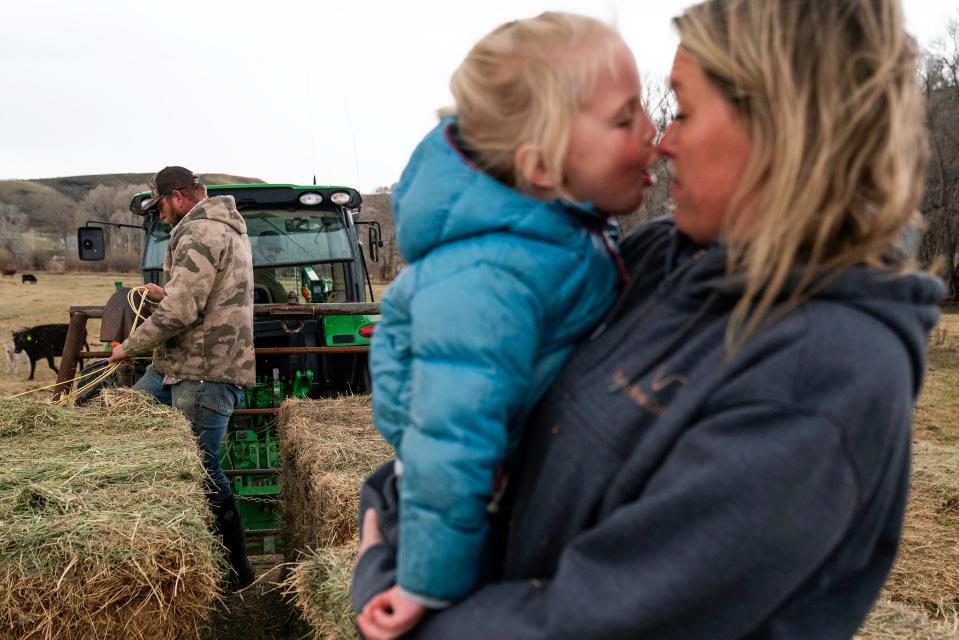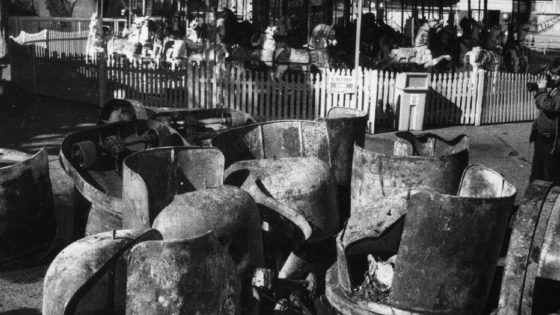Nellie Farrell freaked out when she pulled up to her Grand County ranch headquarters and was “100% sure” she saw a wolf about 30 yards from her sheep and buildings.
She honked the horn, yelled at the wolf, waved her hands to scare it away and took a video of the animal that eventually ran off among the family’s horses in a pasture.
“I left my truck running and was doing jumping jacks and yelling at it and it didn’t run away and didn’t even seem to care that much about me,” she told the Coloradoan regarding the May 30 incident at their ranch near Kremmling. “What freaks me out is if you pull up in your vehicle, any other predator, coyote, mountain lion, bear runs away.
“I have kids ages 3 and 5 and we are outside doing chores twice a day. If they are outside by themselves in that area, how will they scare away the wolf?”
Such close-to-home sightings could become more frequent in Colorado.
No wolf pups seen yet, but wildlife officials believe summer home of the wolves could be near ranches
Farrell said Colorado Parks and Wildlife officials informed the family there is likely a wolf rendezvous site located on public land behind the family’s hunting lodge.
Wolf rendezvous sites are where wolf pups and family members congregate after the pups leave the den and spend the summer. As summer turns into fall, the wolf parents and pups roam farther away from the site to hunt.
Wildlife officials previously confirmed two wolves released in December near the ranch had a den in the area, but no other den sites are known to the agency.
Reid Dewalt, the wildlife agency’s assistant director of Aquatic, Terrestrial and Natural Resources, told the Colorado Parks and Wildlife commissioners at Thursday’s meeting in Winter Park that no pups have been spotted.
He said wolves have pups in April and around eight weeks later, the pups and family move from the den to rendezvous sites.
Those sites generally are in an area such as a meadow with cover and water nearby and where there is little disturbance.
Eric Odell, the wildlife agency’s wolf conservation manager, told the commissioners the agency isn’t entirely sure where the den and rendezvous sites are located.
“We do believe the den is on public land,” he said. “The rendezvous sites are polygons and they can move around and could be on both private and public land.”
DeWalt said the agency is monitoring the area to see if they can spot the pups. He said if pups were born, they would be about 15 pounds by now.

Wolf pups: Good news for Colorado’s recovery plan, potentially bad news for ranchers
The last confirmed wolf pups born in Colorado were in northern Jackson County in April 2021. That’s when two migrating wolves from Wyoming produced the state’s first litter, six pups, in 80 years. That den site was approximately 12 to 15 miles from the Wyoming border.
Colorado Parks and Wildlife officials spotted those pups around the first week of June.
At least three of the wolf pups were legally shot in Wyoming in late September 2022. The only known remaining members of the North Park pack are the breeding male and one male sibling, both of which were captured and fitted with radio collars and still reside are mostly in Jackson County.
In December 2021, about eight months after the North Park pack pups were born, the first wolf depredation of livestock in more than 70 years took place on the Sherman Creek Ranch leased by Don Gittleson, in northern Jackson County.
That pack’s den and rendezvous sites were located near Gittleson’s ranch.
In 2022, Gittleson and area ranchers had 13 cattle and two working cattle dogs confirmed killed by the eight-member North Park pack. The 15 depredations represent half of the total confirmed wolf depredations to date.
Gittleson’s request for the state to remove the North Park pack’s breeding male, which he claimed to be present at all of his confirmed kills, was denied by Colorado Parks and Wildlife Director Jeff Davis.
Six of the seven confirmed wolf kills of cattle in Grand County since April 2 have occurred on the ranch where Nellie and husband Conway Farrell run cattle and sheep. They believe other livestock were killed by wolves, but those have not been confirmed by Colorado Parks and Wildlife.
Wildlife agency spokesperson Joey Livingston stated in an email response to Coloradoan questions that the commission has formally denied two wolf depredation compensation claims since 2021.
Conway Farrell spoke to the commissioners at Thursday’s meeting during the public comment period. He expressed his disappointment in the upper management of Colorado Parks and Wildlife, Department of Natural Resources and Gov. Jared Polis for what he called the “mismanagement of the wolves.”
His main issue was over the state not lethally removing the two released denning wolves as allowed under the wolf management plan’s removal of chronic depredating wolves. He said his ranch in recent months has experienced five separate wolf events, seven kills, four premature calves in six days, two dead calves 30 yards apart, two missing calves and one missing ewe.
“If this ain’t chronic depredation, what is?” Conway Farrell asked the commissioners. “Your wolves have been causing nonstop damage to my family and livestock for the last five months. If CPW was not ready to follow the wolf management plan, why did they release these animals? The stress on the CPW employees, the ranchers and community is something that cannot be fixed. This has now led to locked gates and an end to a lifetime worth of relationships.”
Director Davis has repeatedly denied the Middle Park Stockgrowers Association’s’ requests for removal of the two wolves, saying removing them, or even just the breeding male, would result in den failure and a setback for the state’s wolf recovery plan.
The state’s wolf management plan calls for reintroducing 30 to 50 wolves each year for three to five years. Colorado Parks and Wildlife initially reintroduced 10 wolves captured in Oregon and released in Grand and Summit counties in late December 2023.
The agency planned to release five more wolves early in 2024 but scrapped the idea after receiving heavy criticism from ranchers, county commissioners and legislators over some of the released wolves having a recent history of livestock depredation in Oregon.
It plans to release 15 more wolves in late 2024 captured on Confederated Tribes of the Colville Reservation land in northern Washington.
Conway Farrell told the commissioners he feared for the safety of his two children, given the close encounter his wife experienced and that in the last week ranchers irrigating fields and fixing fences saw wolves on four different occasions within 300 yards of people in broad daylight.
He said despite the use of nonlethal means, including nightly patrols from a range rider, the wolves persist in and around his and other ranches.
“These animals are not afraid of people,” he said.
DeWalt said at Thursday’s commission meeting the agency is creating a temporary ad hoc group comprised of ranchers, wolf advocates and wildlife agency staff to discuss chronic depredation and other issues
He added the agency has provided 5.5 miles of fladry (electrified wire fencing) during this year’s calving season, as well as 60 fox lights and numerous cracker shells to help ranchers ward off wolves. He said the fladry has proven successful in deterring wolves.
The Colorado Department of Agriculture provided $20,000 for the Grand County range rider.
Nellie Farrell said the family, fourth-generation ranchers, are used to living around coyotes, bears and mountain lions but has never had one of those come close to where her children play.
Wolf attacks on humans are extremely rare in the Lower 48 states. There has been one since 1900, a nonfatal attack in Minnesota in 2013. But those numbers don’t allay Nellie Farrell’s fears.
“I don’t want to live my life in fear,” she said. “I have no idea where we go from here. There are a lot of questions without any real solutions, which is frustrating.”
This article originally appeared on Fort Collins Coloradoan: Colorado ranch wife ‘freaks out’ after close wolf encounter
Source Agencies


